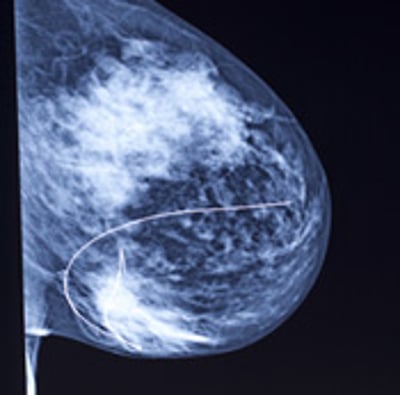FORCE's eXamining the Relevance of Articles for You (XRAY) program looks behind the headlines of cancer news to help you understand what the research means for you.
XRAY is a reliable source of hereditary cancer research-related news and information.
Learn more about the XRAY program
Keyword: ATM
Study : Nearly half of breast cancer patients experience a severe side effect after treatment
Most relevant for: People diagnosed with early stage breast cancer
While clinical trials track treatment side effects, fewer studies look at the burden of side effects on women undergoing breast cancer treatment or compare the side effects of different treatments. This study looks at the severity of side effects experienced by women treated for early-stage breast cancer. (4/11/17)
Read More
Relevance: Medium-High


Strength of Science: Medium-Low


Study : Routine breast cancer screening leads to overdiagnosis
Relevance: Medium-High


Strength of Science: Medium-Low


Most relevant for: Women at average risk for breast cancer
Routine breast cancer screening for women of average risk has been controversial for many years because some believe that the benefits do not outweigh the risks. Recent headlines covering a study in Denmark suggests that routine breast cancer screening leads to “overdiagnosis” of breast cancer. (4/4/17)
Read More
Relevance: Medium-High


Strength of Science: Medium


Research Timeline: Human Research


Study : Research suggests exercise is safe for breast cancer patients at risk for lymphedema
Relevance: Medium-High


Strength of Science: Medium


Research Timeline: Human Research


Most relevant for: People with, or at high risk for lymphedema after breast cancer
Patients and health care providers are often concerned about how exercise affects lymphedema (swelling in the arm or hand) in breast cancer survivors or other women who have had lymph node biopsy at the time of mastectomy. Research on this topic has been mixed. A new study suggests that exercise after breast cancer treatment does not lead to lymphedema or worsen existing lymphedema. However, because this study was small, more work needs to be done to understand the relationship between exercise and lymphedema in cancer survivors. (2/22/17)
Read More
Relevance: Medium-Low


Strength of Science: Medium-High


Research Timeline: Lab Research


Study : Hot chili pepper component slows growth and kills laboratory-grown breast cancer cells
Relevance: Medium-Low


Strength of Science: Medium-High


Research Timeline: Lab Research


Most relevant for: This research is not relevant to people yet
Finding new treatments that target triple-negative breast cancer is an area of great interest. An early step in developing these treatments is learning more about the biology of tumor in the laboratory. This study looked at how capsaicin, the spicy component of chili peppers, might work with a protein found in many cancers, including triple-negative breast cancer, to stop cancer cell growth. This is the first step in a long process towards developing new treatments for triple-negative breast cancer. (2/14/17)
Read More
Relevance: Medium-High


Strength of Science: Medium-High


Research Timeline: Post Approval


Study : A step in the development of a new breast cancer risk assessment tool for Hispanic women
Relevance: Medium-High


Strength of Science: Medium-High


Research Timeline: Post Approval


Most relevant for: Hispanic women
Current tools used to calculate breast cancer risk make their estimations based on data from non-Hispanic white women and may not accurately predict breast cancer risk in women of other races and ethnicities. With further testing, a new risk assessment tool developed specifically for Hispanic women could more accurately predict breast cancer risk in women who do not have mutations in BRCA or other genes associated with hereditary breast cancer. (02/07/17)
Read More
Study : “Chemobrain” seen in breast cancer patients up to six months after treatment
Most relevant for: People diagnosed with breast cancer who have or will be treated with chemotherapy
Many people report memory or concentration problems, commonly known as “chemobrain,” during and after cancer treatment. New research shows that for some breast cancer patients these issues continue 6 months after treatment. Documentation of this well-known effect is a crucial first step in developing ways to limit and treat it. (02/02/17)
Read More
Relevance: Medium-High


Strength of Science: Medium


Research Timeline: Human Research


Study : Does prior antidepressant use affect the treatment breast cancer patients receive?
Relevance: Medium-High


Strength of Science: Medium


Research Timeline: Human Research


Most relevant for: Women diagnosed with breast cancer who have received antidepressants
Previous research found an association between depression and survival in breast cancer patients, but the reasons for this association are unclear. Researchers in this study found that women who had been previously prescribed antidepressants were less likely to receive breast cancer treatment that followed national guidelines than those who had not. Although the difference was small, it underscores the need for patients to discuss any history of depression with their health care providers. (1/24/17)
Read More
Study : Angelina Jolie spoke out on BRCA testing: Did genetic testing increase?
Most relevant for: People interested in genetic testing for an inherited mutation
Angelina Jolie published an editorial in the New York Times in 2013 about her choice to have a double mastectomy after finding out she was positive for a BRCA1 mutation. Researchers from a recent study claim that her celebrity endorsement of BRCA testing may have missed its target audience (previvors), due to the increase in BRCA testing following publication of the editorial but a decrease in the number of mastectomies performed. However, the study failed to take into account that many women without breast cancer do not pursue mastectomy in the months following genetic testing. (1/4/17)
Read More
Article : After mastectomy: reconstruct or not?
Most relevant for: Woman who are facing mastectomy
Today, more women know they can have breast reconstruction after removing their breasts for cancer treatment or risk reduction. But what about choosing not to undergo reconstruction? Roni Caryn Rabin writes about the experiences of women who decide against reconstruction in her New York Times piece “‘Going Flat’ After Breast Cancer.” (12/14/16)
Read More
Relevance: Medium


Quality of Writing: Medium-Low


Article : Headlines claim drug combination destroys tumor in 11 days—is this too good to be true?
Relevance: Medium


Quality of Writing: Medium-Low


Most relevant for: People with Her2-positive breast cancer
A recent IFLScience headline proclaimed "Remarkable Breast Cancer Trial Destroys Tumors in Just 11 Days." This sounds amazing but it leaves out key facts. First, the finding applies only to HER2-positive breast cancer, not all breast cancers. More importantly, the results are from a conference presentation and have not yet appeared in a peer-reviewed scientific journal. What does that mean for breast cancer patients? (12/6/16)
Read More